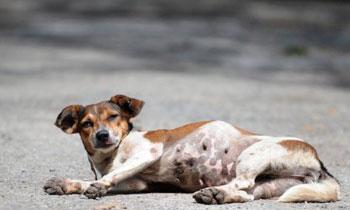
Needles used to paralyse 23 dogs, several cats
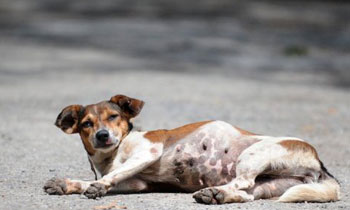
Animal activists expressed outraged today after a video of at least 23 dogs and several cats being stabbed with what looked like needles containing a toxic substance of some sort by persons inside the process of the University of Moratuwa, went viral on social media last Saturday (15).
A student of the Moratuwa University had released three video recordings which appeared to show the university authorities sticking needles into these animals thereby rending them unconscious, however he was allegedly pressurized by the authorities to remove the videos, it was reported.
Groups of animal rights activists, with the support of university students had recovered 10 cats and two dogs on Sunday (16) evening buried in a pit in a land in Homagama.
Animal rights activists who had discovered the dead animals, charged that the animals were injected with “Ketamine”, a chemical that causes paralysis in animals, but the authorities had mistakenly overdosed the cats and dogs leading few to the deaths of these animals.
It was also revealed that the dogs that had been killed within the confines of the Moratuwa University had been sterilized two weeks before by the students who had paid a veterinarian to attend to them with their own funds.
According to the students a similar incident had taken place at the Sri Jayewardenepura University a few months back where upto 100 stray cats and dogs were rounded up by the university authorities and taken away allegedly to be gotten rid of at another location. They further claimed that the university authorities had threatened some of the students with suspension if news of this was leaked to the media.
(Thilanka Kanakarathna)
Source – 16/07/2017, Daily Mirror, see more at – http://www.dailymirror.lk/article/Needles-used-to-paralyse-dogs-several-cats-132902.html
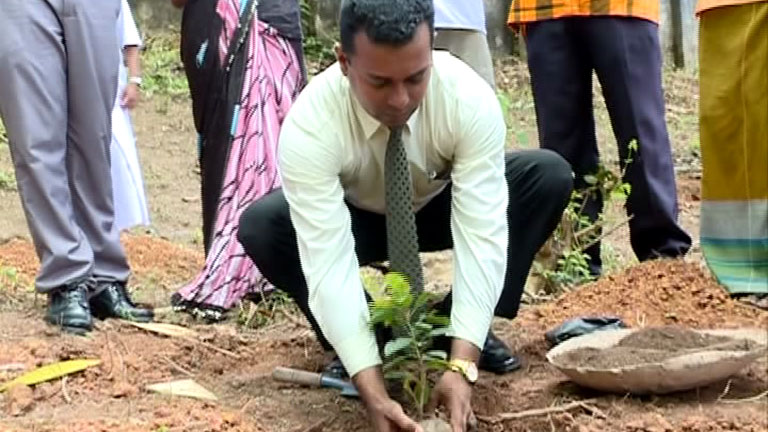
Samurdhi Green Garden launched
A Samurdhi Green Garden has been launched at the Wickremasinghepura Chitthavivekashramaya in Battaramulla.
The Samurdhi Community Organization is implementing the programme of launching environment friendly green gardens in the Wickremasinghepura area.
It was under this programme that this Green Garden was launched on the advice of Chief Incumbent of the Chitthavivekashramaya, the Ven. Kelegammana Wimalarathana Thera.
Many saplings including herbal plants are being planted here. District Samurdhi Director A.G.S. Ashoka Kumara was among those present on the occasion.
Source – ITN News, see more at – https://www.itnnews.lk/local-news/samurdhi-green-garden-launched/

A long walk for water
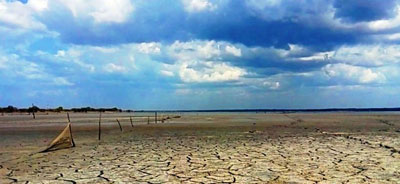
The drought in the Northern, North Central, and North Western provinces has been worsening over the past months.
These photographs captured from various parts of the affected areas show the impact of the drought. Wildlife too have been affected by the lack of water.Drinking water has become the main issue with villagers forced to travel long distances to find water. Farming lands have dried up.
Source – The Sunday Times, see more at – http://www.sundaytimes.lk/170709/news/a-long-walk-for-water-249031.html
Use of polythene, rigifoam, shopping bags banned

Central Environment Authority (CEA) has banned the use of polythene lunch sheets, rigifoam boxes and shopping bags, with effect from 1st of September.
In a bid to make Sri Lanka polythene-free and find a sustainable solution to solid waste management, President Maithripala Sirisena has announced a number of measures including the ban on the import, manufacture and sale of lunch sheets and a ban on the use of polythene for decorations.
Cabinet approval was granted on Tuesday for a series of measures proposed by the President in his capacity as the Minister of Mahaweli Development and Environment to gradually end the use of polythene and thus minimize its environmental impact.
While banning polythene use for decorations the manufacture, sale and use of polythene of 20 microns or less for essential activities on the approval of the Central Environmental Authority (CEA).
The short term measures also include the ban on the manufacture, import or sale of containers, plates, cups, spoons made of polystyrene, the ban on the sale of processed or cooked meals packed in polythene containers and the promotion of paper, cloth or reed bags or biologically degradable plastics for customers when purchasing items in stores, prohibition of burning polythene and plastic in open places introduction and promotion of biologically degradable polythene and plastics.
Tax concessions would be provided to import machinery for the manufacture of biologically degradable plastic and a cess tax of 15% on the import of plastic raw material and goods.
In the long term the use of recycled plastic products would be banned.
Cabinet Spokesman and Health Minister Rajitha Senaratne told the reporters at the weekly cabinet news briefing yesterday that the short term measures will be effective from Tuesday after the proposals were approved by the Cabinet.
The long and medium term measures need legislative approval for their implementation and therefore it takes time.
Responding to a journalist, he said people would go back to good old habits of using perishable lunch wrappers and food containers when the ban of polythene was in place.
(Sandun Jayasekara)
Source – 12/07/2017, DailyMirror, see more at – http://www.dailymirror.lk/article/Use-of-polythene-rigifoam-shopping-bags-banned-132675.html
Navy rescues Jumbo at sea


A group of naval personnel attached to the Eastern Naval Command rescued an elephant caught in a current in the seas off Kokkuthuduwai, Kokilai yesterday. Navy said the elephant dragged away by current was initially noticed by a Fast Attack Craft on routine patrol in the aforesaid sea area.
Thereupon, another Fast Attack Craft on patrol and a team of navy divers were promptly directed to the location by the Navy. A group of officials from the Department of Wildlife also joined in the rescue operation and later they were able to direct the elephant towards the coast from the deep sea.
Having safely guided the elephant to the Yan Oya area in Pulmodai , the elephant was handed over to the Wildlife officials.
(Navy Media)
Source – 12/07/2017, DailyMirror, See more at – http://www.dailymirror.lk/article/Navy-rescues-Jumbo-at-sea-132624.html
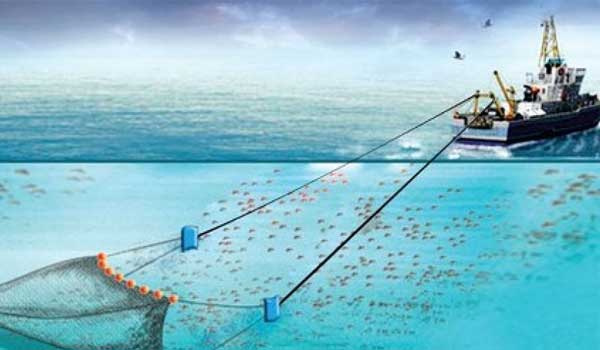
New Bill to strengthen laws against illegal fishing

A Bill to further strengthen the legal framework against illegal fishing methods including bottom trawling will be tabled in Parliament today (6th July), said Minister of Fisheries and Aquatic Resources Development and State Minister of Maheweli Development Mahinda Amaraweera yesterday. (CDN)
Source – Ceylon Today, See more at – http://www.ceylontoday.lk/article20170401CT20170930.php?id=5592

HVA Farms dismiss environmentalist claim Lands were acquired through SC – Chairman

By Umesh Moramudali and Rathindra Kuruwita
Chairman of HVA Farms Rohan Fernando asserted that lands belonging to the group were acquired through the Supreme Court, and permission was granted to conduct farming. He made this comment in response to an allegation made by environmentalist Sajeewa Chamikara, who in an interview carried by Ceylon Today last week, claimed that the HVA farms procured lands through illegal means.
Fernando added, it was the government that identified the 225 acres given to HVA Farms and stressed they do not want to cut down trees. In fact out of the land given HVA Farms can utilize only 60 per cent as it maintains all wooded areas in its natural habitat.
Excerpts:
Q: Can you give an overview of HVA farms and about its operations?
A: HVA Farms is a company started in 1995 to go into organic agriculture. This was the time during which the country was in the middle of a bitter war. When starting the farm, we were shown places by the government and Eluwankulma was very vulnerable.
People thought I was crazy to go there and do a business when I could do it without much trouble in Colombo. But my theory was that businesses need to go there as the people in these areas have suffered. These were the areas in which Tamils and Sinhalese live side by side and most of the Sinhalese have married Tamils and it was an integrated society. Now most of the inhabitants in this area are Muslims.
There was potential and also the risk factor. It was the MPs in these areas who asked me to come there and assist the people. We did this not with the intention of grabbing land. We are not scouts and we went there based on the requests made with a genuine intention. So our concept was whatever we do, we do it with 100 per cent environment compatibility.
We use traditional agricultural practices, such as using Karadahaiya which is used to make the soil better and increase drainage ability.We use these things.
We do not even let urea into the soil as it could result in contamination of the water belt. We collect the urea and use it for the manufacture of compost. These are the concepts we are practicing at present.
We also use solar power. We are one of the pioneers to use solar pumps and we even use the same power to generate the electric fences to prevent the movement of elephants.
Going back to the start of this farm we were provided 25 acres from the government on an annual lease to cultivate crops. However we informed the authorities that this was not viable and therefore suggested a larger land area of 500 acres for commercial agriculture.
The agriculture sector can be developed only through commercial crops where small farmers can be benefited as well since their productions are purchased at the farm gate.
By 1996, the government was very happy on our progress and the relevant authorities visited the farm during the same year.
Chairman of the North -Western Environment Authority Saman Ekanayake also visited the farm and later 500 acres of land was allocated to us.
We were told to proceed with the Environment Impact Assessment (EIA).
We had also received approval from the Wildlife Ministry, the Environmental Authority, the Archeological Department, the Road Development Authority (RDA) and several environment associations.
Then the Non Governmental Organisations (NGOs) came on to the scene. They made a huge fuss over it and went to the court and took an injunction against the farm. By then 25 acres had already been cultivated and we were exporting Papaya. The court injunction was delivered even without a proper inquiry and we were banned from entering the farm.
The claim by the NGO’s was that we had felled trees in order to cultivate Papaya. Technically we did not cut a single tree. Instead we only cleared the bush and the undergrowth. Anything beyond that was not cut. Then we went to the Supreme Court. The SC decided to remove the injunction and allowed us to proceed. The highest court in the country realized that we were mistreated. The Supreme Court even stated that organic agriculture farming is the best model for Sri Lanka.
It was the government that identified the 225 acres and provided it to us. The North Western Province Environment Authority issued documents with guidelines on conducting the operations. All the trees were numbered and we were instructed not to cut any large trees. We also do not want to cut trees since we are not loggers. In fact out of the land given we can utilize only 60 per cent as we have left all the wooded areas intact.
I informed the Supreme Court that I could carry out a similar project in Malaysia as the authorities in that country had pledged to provide us 5000 acres of land. However the Supreme Court insisted we carry out the project in the country and even added that our project is a very good example.
Fifty acres were also required for water reservation.
If we had violated a single law would the Supreme Court allow us to proceed? How can these NGOs claim that we have occupied the land illegally? If they have issues they can go to the Supreme Court instead of spreading incorrect information.
These guys are trying to oust me from the farm. It was not me who decided about the land it was the government surveyor who did this. So they should take then matter up with him. There is a racket going on with the support of the wild life officials and others.
We have learnt to live with the wild life. That includes dealing with elephants. So far we have not had any human elephant conflict on our farm.
There are a lot of issues. I am a fighter and I will fight this out.
What we will have in 175 acres is a similar project. We need to build barn houses, Scottish style in which roofs are solar panel and later we are hoping to promote agri tourism as well. We will use solar power for these projects as well. We have a good system to get water and our wells are clean. People in the area also use water from our wells. We want to make this place free of CKDU by having clean water. We also hope to plant 100,000 trees as well.
Q: How many have you employed in your farm? And how many indirect beneficiaries?
A: we have 100-200 direct employees and unlimited number of people benefit from the project as we purchase the harvest from the farmers at the gate. We are developing a branded certified product. We have a trade network in 40 countries. A lot of people are seeking safe food today hence organic products has a demand. Also it is important to sell organic products to the local market.
Even now we are late on organic farming. But we need to start giving prominence to this method. There are a lot of organic properties that we can use for farming, not merely biomasses. We have enough and more organic pesticides. Kohomba, garlic and Perumkayam are good examples. We use a lot of experiments in using these. We have an in-house research department and we do a lot of studies linked to production and organic agriculture.
Q: You spoke about concentrated compost. Is that an expensive product?
A: It depends on how you look at the produce. Also organic agriculture keeps the soil alive. In Sri Lanka, due to theamount of chemicals put into the earth, the soil is dead. That has become a serious concern. You see a lot of sicknesses such as CKDU. A lot of farmers are sick.
Q: You spoke about the importance of giving people access to healthy food. However organic food is expensive inSri Lanka and most organic products are exported. What should be done to make organic food more available to the people?
A: Organic products should not cost more. It should be given it at the same price. The matter is that since it’s a new thing people are paying a premium and buy it. But there exists a myth that the cost of production of organic products is more. That is not true. The biggest cost in agriculture is labour. Therefore, we are thinking about purchasing machines since they are cheaper and more efficient.
Source – 10/07/2017/ Ceylon Today, see more at – http://www.ceylontoday.lk/article20170401CT20170930.php?id=5632

Green Energy Champion 2017 campaign launched
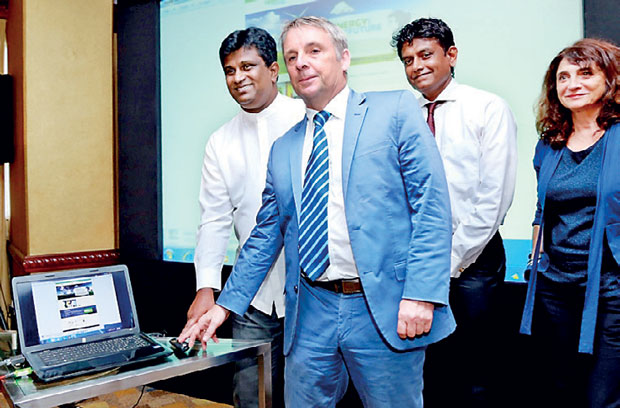
Increasing awareness for energy efficiency, becoming less dependent on fossil fuels and reducing carbon dioxide emissions – these are main targets of Sri Lanka’s current energy policy.
The country has excellent conditions for using solar energy, biomass, hydropower and wind energy. The German Federal Foreign Office together with the Power and Renewable Energy Ministry of Sri Lanka and the project implementing partner Deutsche Gesellschaft für Internationale Zusammenarbeit (GIZ) GmbH and Sri Lanka Sustainable Energy Authority have been working closely together to make Sri Lanka’s energy transition
a success.
Recently, all involved partners launched the second round of the Green Energy Champion Sri Lanka initiative, a countrywide competition identifying and recognizing innovative ideas on improving energy efficiency and encouraging the use of renewable energy in the country. 
The launch event was graced by Sri Lanka Power and Renewable Energy Deputy Minister Ajith P. Perera and Sri Lanka and the Maldives German Ambassador Jörn Rohde.
The Green Energy Champion 2017 launch comes post a very successful first project phase last year in which 700,000 media users were reached with energy-saving tips and background information on renewable energy. Ananda College Colombo was declared as the winner of the first countrywide competition for their holistic approach to energy efficiency.
Their award-winning project, which was implemented in autumn 2016, included the installation of a solar PV system, which generates over 24,000 kilowatt hours annually, the upgrading of the school’s composting system and the introduction of a solid waste management system. Further, several awareness trainings with more than 7,000 students and teachers were carried out.
Now the initiative is looking for another blueprint ‘Green Energy Champion’, who would become a showcase for sustainable and clean energy solutions. The winning entry would be awarded with technical equipment worth up to Rs.10 million (60,000 euros) and technical expertise for its implementation.
The competition intends to inspire Sri Lankans to submit tangible ideas how to use renewable energies in their environment. A questionnaire will guide them to compose an action plan together with an estimated budget.
After all applications have been screened, the representatives of the five most promising ideas will be invited to a workshop to practice their communication and management skills and receive further input on renewable energies, energy efficiency and technical feedback on the proposal presentations.
At the end of the workshop the participants will pitch their ideas. The winner will be determined by a jury comprising of representatives of the German Embassy, Power and Renewable Energy Ministry, Sri Lanka Sustainable Energy Authority and GIZ.
During the launch event, Rohde said, “Climate change is a major challenge of our time. We need to adjust the way we generate and consume electricity. I am sure that our Green Energy Champion campaign triggers many Sri Lankans to submit innovative renewable energy ideas, which help their country to make its energy transition a reality. Germany will continue to support Sri Lanka’s path to a sustainable green energy future.”
Source – DailyMirror, See more at – http://www.dailymirror.lk/article/Green-Energy-Champion-campaign-launched-132204.html

Dehiwala Zoo visiting hours extended
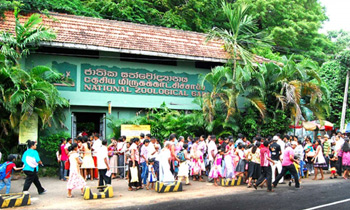
In a bid to ensure visitors have more time to spend at the Dehiwala Zoo, a decision was taken to extend its visiting hours.
Accordingly, the zoo will be open for the public from 7.00 a.m. to 10.00 p.m. from the month of September, Wildlife Minister Gamini Jayawickrama Perera said recently.
The minister said additional attractions would be established at the premises.
However, the Daily Mirror was unable to obtain further details about the changes at the zoo.
Source – DailyMirror, see more at – http://mirrorcitizen.dailymirror.lk/2017/07/04/dehiwala-zoo-visiting-hours-extended/
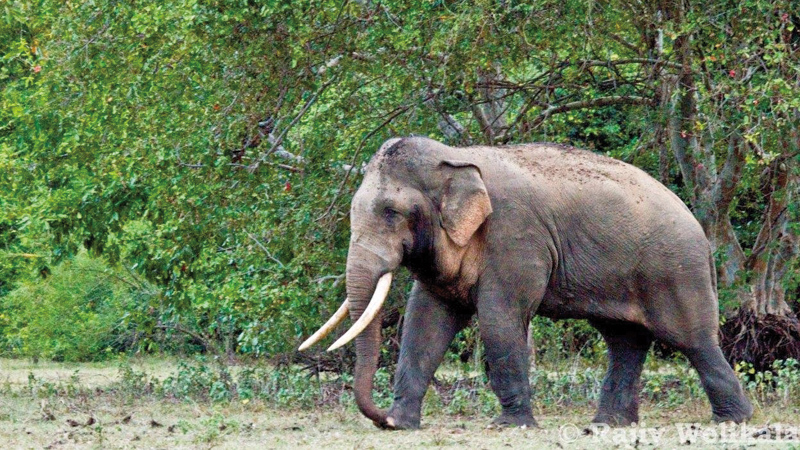
Renewed calls for GPS tracking collars for endangered tuskers
Environmentalists have renewed their call for GPS tracking collars to protect the endangered elephant population in the country with the wild the number of jumbo deaths on the rise.
The latest call comes in the wake of Deega Danthu, the famous tusker being injured and found lying by the bank of Kala Wewa after several days.
Highlighting the importance for a proper monitoring system to protect these tuskers, environmentalist Supun Jayaweera says the Department of Wildlife, which is the legally authorised guardian of these animals, should take necessary steps to introduce GPS tracking collars to these animals.
The Tusker of Kala Wewa, a rarest of the 1% tusker community in Sri Lanka injured due to human activity was found yesterday (08) near Kala Wewa.
The Department of Wildlife is providing the tusker with the necessary medical treatment and Jayaweera said hopefully,the tusker will survive his injuries.
According to Jayaweera, the tusker is suffering from an injury sustained by a gun shot to one of its front legs, above the ankle.
“The injury seems to have been caused by a trap gun,” he said.
“There is no life threatening situation for Deega Danthu at present. Even though the injury seem less serious, when tuskers like these fall it is not easy to get them back on their feet. Deega Danthu is unable to carry his weight with the injured leg at the moment,” Jayaweera explained.
As Deega Danthu lie fighting for life, Jayaweera points out that lack of proper monitoring of these tuskers has put their lives at stake. He observes that Mahasen, an equally rare tusker who roams the banks of the Minneriya reservoir and the sacred grounds of Somawathiya has suffered from numerous gunshot injuries. “The continuation of the line of tuskers in Sri Lanka depends on these tuskers.Therefore,their security is something that should be taken very seriously,” Jayaweera said.
“Deega Danthu was found after several days after it was initially injured. Unless someone reports that a tusker is injured or if the Wildlife officers look for a tusker noticing its absence, there is no method to find out if a tusker is in danger or not,” Jayaweera further said.
Jayaweera also said the umbrella protection provided to national parks is insufficient forthese tuskers who have a behavior pattern of migrating from one wilderness to another continuously.
Environmentalist Shashikalana Ratwatte speaking to the Daily News says wildlife conservation policies regarding these tuskers and wildlife at large must undergo drastic changes.
Ratwatte described the present wildlife conservation policy adopted by the Wildlife Department to be “out dated” and emphasised the importance of upgrading it up to that of international standards like in African countries.
“These countries use sophisticated high tech programmes to protect tuskers and other endangered animals. These programmes consist of extensive procedures from locating a wounded animal to relocating it after treatment. Sri Lanka too should adopt an similar methods,” Ratwatte explained.
Ratwatte also points out that the unavailability of correct data on tuskers and elephants in Sri Lanka is yet another serious limitation.
“According to the data collected by the last official survey conducted in 2012, there were 6,000 elephants in Sri Lanka. I personally do not agree with this data. There is only a 14% forest area of Sri Lanka’s land area. It is impossible for 6,000 elephants to live in such a area,” Ratwatte said.
Ratwatte also said according to authorities, there are 240 tuskers in Sri Lanka whereas according to their sources, there are only 120 tuskers roaming the wilderness of Sri Lanka.
Ratwatte further said measures should be taken to connect all national parks creating a safe route for migrating tuskers and stop human activities near traditional ‘Alimankada’.
He also highlighted the importance of ensuring environment eutrophication in forests in Sri Lanka.
Meanwhile, Sustainability and Wildlife Ministry Secretary R.M.D.B. Meegasmulla says the Department of Wildlife has already begun to reintroduce GPS tracking collars for tuskers. He said that such tracking collars were used sometimes back by the Wildlife Department. “There were some allegations that a tusker died due to a tracking collar which temporarily halted its use,” Meegasmulla explained.
Meegasmulla further said they are also to establish an elephant holding ground in Lunugamwehera, one similar to that in Horowpatana. He also said the Wildlife Department is all set to conduct a survey of elephants on coming September, 2017.
http://www.dailynews.lk/2017/07/10/local/121442/renewed-calls-gps-tracking-collars-endangered-tuskers




